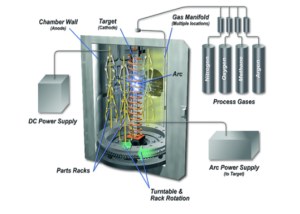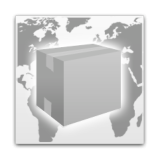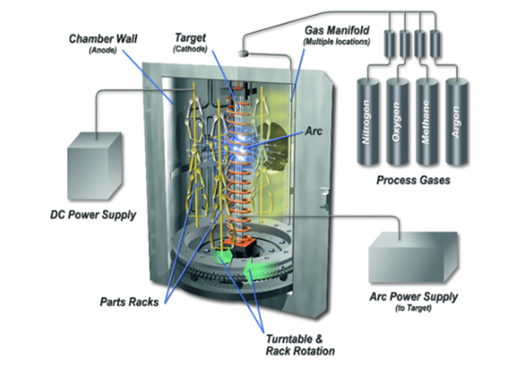PVD COATING
PVD COATING
Physical vapour deposition, just ar PVD coating, as we usually call it, refers to vacuum ion plating and vacuum sputter plating; Generally speaking, ncvm coating refers to vacuum evaporation coating. The basic principle of PVD surface treatment is to vaporize the coating material under vacuum, and then deposit it evenly on the surface of the target part through electrons. The advantages of PVD on plastic are: good adhesion of coating (good mechanical properties), strong winding ability (adjustable target position and electroplating path), good coating quality (dense, uniform, high strength and long service life), simplified cleaning process (with cleaning function), and a wide range of plating materials (metal and non-metal can be plated).
Does PVD Coating Wear Off?
The wear resistance of white pvd plating system is different with different electroplating materials. For example, the CRN coating on the surface of bearings and cutting tools has strong wear resistance and is not easy to wear off.
Is PVD Better Than Stainless Steel?
Aluminium PVD Physical Vapour Deposition is a surface treatment process. PVD surface treatment aims to improve or improve the performance and appearance of metal surfaces, and cannot be compared with the performance of cheap CNC material.
Types Of PVD Coating on Plastic Parts
There are different types of pvd titanium coating sdn bhd that can be offered depending on the application requirements. Titanium Nitride (TiN), Chromium Nitride (CrN), Titanium Aluminum Nitride (TiAlN), Titanium Boron Nitride (TiBN) are some examples of PVD coatings.
PVD Coating Advantages
Physical vapour deposition coatings offer the following benefits:
PVD surface treatment has high hardness (2400-4000 HV) (~ 80-90 HRc).
PVD physical vapour deposition is high abrasion resistance.
PVD metal coating is low friction coefficient (high surface lubricity)
Reduced tool heating due to low thermal conductivity of PVD physical vapor deposition.
Physical vapor deposition coating is well resistance to chemical environments
PVD metal finish can increase surface quality of the machined parts
Preventing the processed parts from adhering to the tool-mold surface
No change in dimensions due to PVD coating thickness at micron level
Decrease in tool cost per piece due to increased tool physical life
Decreasing in workbench downtime periods since tool change frequency are decreased
PVD surface treatment can obtain homogeneous coating thickness in each area
PVD Coating Technology
PVD coatings can be applied on components using different PVD technologies such as arc evaporation, magnetron sputtering to name a few. HEF specializes in plasma enhanced magnetron sputtering, CAM (coating assisted by microwaves) and modified arc evaporation coating technologies. PVD coating technology is the most important one of the methods in which hard ceramic coatings can be successfully applied on mold and tool surfaces. This PVD technology is based on the principle of ionic accumulation of materials under vacuum by being evaporated and/or sputtered on the surface, to which the coating is to be applied.
PVD Coating Applications
PVD coating can be found in a broad range of products. For example, PVD surface treatment is frequently used in architecture. There is a wide range of PVD coating applications, which is why it is commonly used in high-tech industries. Some of the industries and applications in which we have applied PVD physical vapor deposition coating include coating on composites for aerospace, titanium on medical implants and surgical tools, gold thin film to replace plating for electronics, non-metal, chemical resistant oxides for semiconductor parts and hard ceramic coatings for industrial tools.
PVD Coating Thickness
In general, PVD surface treatment is thin film and are in the range of 1 to 5 microns. For reference, 25 microns equals 0.001 inches. Red blood cells are around 8 microns in diameter, while human hair is around 80 microns in diameter. Thus, PVD coatings are extremely thin-film coatings with thickness specification defined within this 1 to 5-micron range depending on the application requirement.
PVD Coating Hardness
PVD physical vapor deposition coatings have a hardness value around 1500 – 4500 HV (Vickers) depending on the types of PVD coating offered. Vickers (HV) is a microhardness unit for measuring PVD thin film coatings. For reference, 900 HV corresponds to 67 HRC (Rockwell C) hardness. Generally, carbon steels have a hardness range around 250 HV (25 HRC), nitrided or nickel and chrome plated steels fall in the range of 600 HV to 1000 HV surface hardness. Thus, PVD coatings are extremely hard and hence, very durable and wear resistant.
Shenzhen Richconn Technology Co,. Ltd , as a China CNC machining oem factory, was established in 2012 and has two processing bases in Shenzhen and Dongguan, Guangdong, of which the Shenzhen base covers an area of 5000 square meters and the Dongguan base covers an area of 3000 square meters.
Personne à contacter : .com richconncnc, 086 0755 28025755
Bonne affaire : acheter au vendeur
Nous vous invitons à lire nos conditions générales d'utilisations. Vous pouvez aussi vous rendre sur nos FAQ et consulter notre page d'informations sur les risques liés à la contrefaçon.
|
Cette page concerne les importateurs et exportateurs de PVD COATING Rechercher dans la catégorie : Pro / B2B Rechercher dans la catégorie : coating |
Mercredi 26 septembre 2007
ENTREPRISE BELGE DE FONTAINE - L'EVEQUE DE LA REGION DE CHARLEROI. Sabots sanitaires brevetés et certifiés pour les professionnels Pour le personnel hospitalier, infirmier(e), étudiant infirmier(e), aide soignant(e), personnel de maison de retraite, de labo, de supermaché, technicien...
PATRICIA SABOTS S.P.R.L
- 123patricia
- 6140 - FONTAINE-L'EVEQUE
- +32 0 71 52 86 31
- +32(0)475 37 15 40
Jeudi 16 juin 2016
Properties Made of polyester film of 12 microns. Metallic gloss, soft gloss and matte effects, gives the different reflections. “Release resistance” of foils to be sold are “moderate” level. resistance of so-called “moderate” level. In this way, the “silver dust” problem is reduced...
UES Makine Tekstil Inşaat ve Gida San.Tic.Ltd.Şti
- 34510 - Istanbul
- +902125571040
Samedi 06 octobre 2012
Quantité : 6 - Prix : 0,00 €
Appareil d'entraînement pour le dos... votre thérapeute à domicile ! L'appareil développe un doux bercement rythmique circulaire continu du bassin, de l'avant vers l'arrière et d'un côté vers l'autre que l'on définit comme " Mouvement passif continu " qui permet de relâcher doucement...
WTC
- 57000 - METZ
- 06 51 05 50 33
Paiement sécurisé









